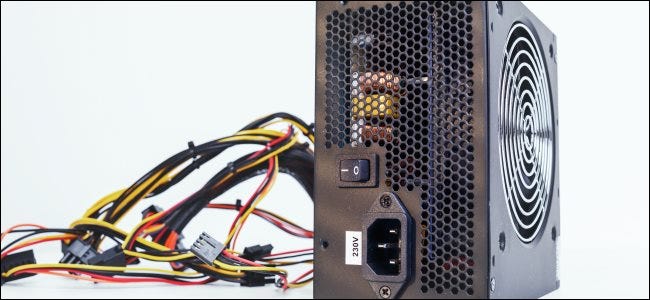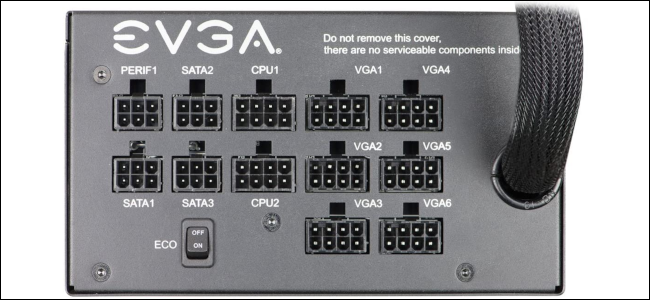
How Important Is the Power Supply (PSU) When Building a PC?

The power supply (PSU) is a critical part of any PC. It powers all the components in your PC, and a bad or faulty one can bring everything down. Here’s what to look for in a power supply while putting together a PC.
A PSU Is a Critical Piece of PC Infrastructure
When we turn on a light, open a faucet, or walk down a nicely paved street, we don’t often think about the wondrous infrastructure making all that possible. But if somebody hadn’t taken the time to think about it, things wouldn’t be so wondrous.
It’s the same when building a PC. We get obsessed with how many cores a CPU has or the number of computing units in a GPU. But rarely do we think twice about the power supply unit (PSU,) which provides power to everything else in your PC.
You don’t need to think about your power supply too much, of course. But, if you don’t consider the PSU at all, there’s a good chance you’ll be thinking about it a lot once it starts causing problems.
If your computer doesn’t get enough power or the PSU malfunctions, there are a number of issues that could appear. Your system may not boot, the entire system might become unstable—or it might simply shut down when the demand for energy exceeds capacity. There’s also a chance that more expensive components may get damaged from the instability.
The good news is you don’t have to get too far into the details to pick a good power supply. There are many tools online that will help you figure out the right kind of power supply for your build.
Watts

As cores are to a CPU, so wattage is to a PSU. It’s the major feature people look at as it tells you how much power a PSU can push out. A good rule of thumb is to shoot for about 25% or more of headroom from what the expected output for your PC is. So if your maximum expected output is 400 watts, then a 500W or 550W PSU would run it easily and provide some future-proofing should you ever upgrade your PC with a component requiring more power.
So, how do you figure out your expected output? You can use a site like PC Part Picker, which will show you expected watt requirements based on your components. There are also many power supply calculators online, such as those from Newegg and Extreme Outer Vision, with the latter being a popular choice. Don’t be surprised if each calculator comes up with a different recommendation as these are just estimates. Newegg’s tends to be a little on the high end, for example.
One last thing before we leave this topic is that you may come across people talking about the importance of rails in a PSU; however, this is not as important as it once was. If you want a quick breakdown on the subject, check out this Techquickie video.
Ratings

When you look at PSUs you’ll see that they have 80 Plus ratings named after different metals including Bronze, Silver, Gold, Platinum, and Titanium. There’s also a plain 80 Plus rating with no metal name attached to it.
These are efficiency and reliability ratings. 80 Plus means the power supply is 80% efficient or higher at loads (the power demands on the PSU) of 20%, 50%, and 100% at 115 volts and 230 volts. The efficiency requirements change, depending on the capacity and voltage, and the more valuable the metal name in the rating the more efficient the PSU has to be.
For example, at 50% load and 115V an 80 Plus Bronze PSU is supposed to hit at least 85% efficiency, while a Titanium PSU at that load and voltage should be 94% efficient.
Part of the reason these efficiency ratings were developed is that, as with most things electric, PSUs are not 100% efficient. In fact, they lose some energy in the form of heat. That doesn’t mean, however, that a 400W PSU can’t supply that much power because the wattage on the box tells you a PSU’s maximum throughput.
You can find a list of 80 Plus certifications online, but the important thing to note is that the higher up the “value” ladder you go for each metal, the more efficient the PSU is supposed to be.
In general, you want a power supply that’s as efficient as you can reasonably afford at the wattage you need.
Other Important Features in a PSU

Whether you’re building your own PC or just replacing the PSU on an old machine, there are a few more important considerations. First is the issue of a modular, semi-modular, or non-modular PSU.
A modular PSU comes with no cords attached to it at all and is usually referred to as “fully modular” at online stores. With a fully modular PSU, it’s up to the PC builder to connect the cords they need. A semi-modular supply, on the other hand, has a number of cables that are non-detachable. These are usually the essentials, such as the 24-pin power cable, the power connector for the CPU, and others. Anything else you need can be added just like with a modular supply. When you’re shopping around, semi-modular PSUs can be called “modular” or just “semi-modular.” Finally, there are also non-modular supplies with all cables permanently attached to the power supply.
Related: How to Charge Your Smartphone While Camping
The biggest advantage of a fully modular PSU is that you control how many cables are lurking in the back of your PC. Even with a semi-modular unit, you can end up with excess cables that aren’t connected to anything and take up space in the back of the case.
Non-modular PSUs tend to be a little bit cheaper than the other two, but you’ll have to deal with stashing a ton of cables in the back of your case, which can be a real pain. If you can spend the extra money, it’s well worth it to go for at least a semi-modular PSU for a cleaner build.
We’d also suggest sticking to a PSU from a well-known company. There are tons of power supplies out there from numerous companies most of which you’ve never heard of. That could set you up for a blown PSU sooner than you anticipated not to mention potential damage to other parts of your system.
Stick with companies like Corsair, EVGA, Cooler Master, Thermaltake, and other well-known ones to be reasonably certain you’re getting a good quality PSU. That’s by no means a guarantee, but it’s a safer bet than a random PSU from an unknown company.
Finally, we’d suggest paying close attention to the warranty. While we often don’t think about warranties for other items, it’s a crucial part of a PSU. There are many PSUs out there that come with 5- or 10-year warranties meaning you can be more certain these units will last for multiple PC builds. And if they don’t, you can always file a warranty claim.
You don’t need to get obsessed with a PC’s power supply, but take a few important issues into consideration and you can rest easy with a solid choice.







Leave a reply